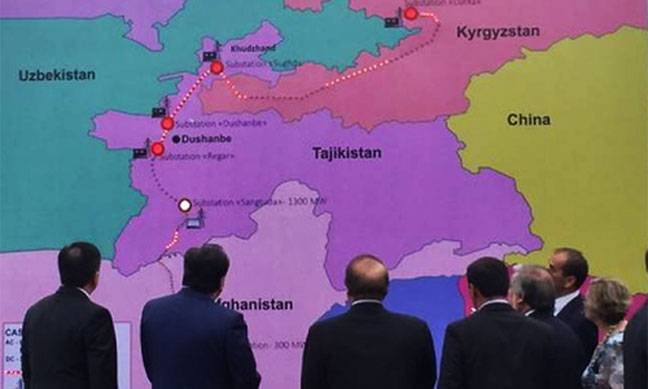ISLAMABAD - The Central Asia-South Asia power project (CASA-1000) is in full swing and would ready to transmit surplus hydroelectricity from Tajikistan and Kyrgyzstan to Pakistan and Afghanistan by mid 2020, a diplomat from Tajikistan said.
Afghanistan is responsible for providing security to the CASA-1000 transmission line in its area and the project will be ready to supply power to Afghanistan and Pakistan within next two years, said the first Secretary of the Embassy of Tajikistan, Bahodur Buriev, while talking to a selected group of journalists about International Conference on the International Decade for Action "Water for Sustainable Development, 2018-2028" held in Dushanbe, Tajikistan, on 20-21 June 2018.
The Tajik diplomat said that according to the some information and media reports, Taliban have assured that they would not harm the CASA-1000 Transmission line.
The project was launched in May 2016 for transmitting 1,000 MW of electricity to Pakistan and 300 MWs to Afghanistan, during the summer season, from the hydro energy rich Tajikistan and Kyrgyzstan. The project will be completed with an estimated cost of $1.2 billion. Bahodur Buriev said that Tajikistan has proposed to expand public-private partnership to open new opportunities to attract additional investments in the water sector and infrastructure.
Tajikistan President Emomali Rahmon had urged to focus efforts on increasing the efficiency of using available financial resources and finding new sources of financing for water-related industries.
In this respect, the expansion of public-private partnership opens new opportunities for attracting additional investments in the water sector and infrastructure, Buriev said adding that the beginning of the Decade, is aimed at forming a broad and open platform for strengthening and expanding the regular multilateral water dialogue with a focus on concrete actions.
He said that President of Pakistan was also chief guest of the conference and both countries could cooperate in future to strengthen water infrastructure.
According to the calculations of the World Bank, only to achieve the two objectives of the 6th Goal of Sustainable Development, namely, universal access to safe drinking water and sanitation, will amount to $114 billion annually.
He said that Tajikistan President had said that joint efforts in this direction had also laid a solid foundation for the development of a new sustainable development agenda, in which water resources are given a central place as a key element of this process.
More than 800 million and 2.5 billion of the world's population, respectively, do not have access to safe drinking water and basic services in the field of water sanitation.
All this indicates that we are still considerably behind in the practical implementation of the set goals and objectives in the field of ensuring access to safe drinking water and sanitation, first secretary said adding that demand for water resources in the world is growing at an accelerated pace, which, in turn, causes tense relations between sectors of the economy.






